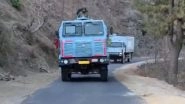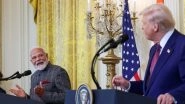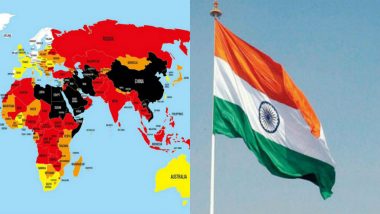London, April 18: India has dropped two places on a global press freedom index to be ranked 140th out of 180 countries in the annual Reporters Without Borders analysis released on Thursday, with the lead up to the ongoing Indian general elections flagged as a particularly dangerous time for journalists. 'Narendra Modi's Troll Army' Brings Down India's Rank in World Press Freedom Index.
The ‘World Press Freedom Index 2019', topped by Norway, finds an increased sense of hostility towards journalists across the world, with violent attacks in India leading to at least six Indian journalists being killed in the line of their work last year.
"Violence against journalists – including police violence, attacks by Maoist fighters and reprisals by criminal groups or corrupt politicians – is one of the most striking characteristics of the current state of press freedom in India. At least six Indian journalists were killed in connection with their work in 2018. A number of doubts surround the seventh case,” the index noted.
These murders highlighted the many dangers that Indian journalists face, especially those working for non-English-language media outlets in rural areas, it said. Attacks against journalists by supporters of ruling BJP increased in the run-up to general elections in the spring of 2019, the analysis alleged.
Paris-based Reporters Sans Frontieres (RSF), or Reporters Without Borders, is a non-profit organisation that works to document and combat attacks on journalists around the world. In its 2019 index, RSF finds that hatred of journalists has degenerated into violence, contributing to an increase in fear around the world. 'Reporters Without Borders' Red-Flags India on Killing of 7 Journalists in Last 18 Months.
In reference to India, it found an alarming rate of “coordinated hate campaigns waged on social networks against journalists who dare to speak or write about subjects that annoy Hindutva”.
"The campaigns are particularly virulent when the targets are women. The emergence of a #MeToo movement in the media in 2018 has lifted the veil on many cases of harassment and sexual assault to which women reporters have been subjected,” it noted.
"Finally, coverage of regions that the authorities regard as sensitive, such as Kashmir, continues to be very difficult. Foreign reporters are barred from Kashmir and the Internet is often disconnected there," it added. South Asia in general features poorly on the index, with Pakistan dropping three places to 142, and Bangladesh dropping four places to 150.
“The number of countries regarded as safe, where journalists can work in complete security, continues to decline, while authoritarian regimes continue to tighten their grip on the media,” RSF concludes.
Norway is ranked first in the 2019 Index for the third year running while Finland (up two places) has taken second place from the Netherlands (down one at 4th). An increase in cyber-harassment caused Sweden (third) to lose one place. In Africa, the rankings of Ethiopia (up 40 at 110th) and Gambia (up 30 at 92nd) have significantly improved from last year's Index. At the bottom of the Index, both Vietnam (176th) and China (177th) have fallen one place and Turkmenistan (down two at 180th) is now last, replacing North Korea (up one at 179th).













 Quickly
Quickly


